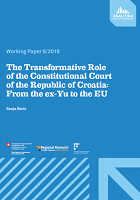The Transformative Role of the Constitutional Court of the Republic of Croatia: From the ex-Yu to the EU
The Transformative Role of the Constitutional Court of the Republic of Croatia: From the ex-Yu to the EU
Author(s): Sanja Barić
Contributor(s): Edin Hodžić (Editor), Wojciech Sadurski (Editor), Mirela Rožajac-Zulčić (Editor)
Subject(s): Politics, History of Law, Constitutional Law, Politics and law, Post-War period (1950 - 1989), Transformation Period (1990 - 2010), Present Times (2010 - today), EU-Approach / EU-Accession / EU-Development, Court case
Published by: Analitika – Centar za društvena istraživanja
Keywords: Croatia; Constitutional Court; transformative role; politics;
Summary/Abstract: As part of a general study on the role and impact of constitutional adjudication in transitional countries of South East Europe, this paper analyses the operation of the Constitutional Court of the Republic of Croatia after the dissolution of the Yugoslav federation. It aims to answer the posed research questions as to the extent of the Court’s activism in the field of transitional constitutional justice and, consequently, the Court’s success/failure in promoting the legal transition from a socialist order to a modern constitutional democracy. In that view, a narrow but paradigmatic selection of the Court’s case-law is analyzed. Factors that have contributed to the Court’s performance (e.g. political conditioning, personal features) are taken into account, as well as public opinions and attitudes toward its rulings. The first part of this paper presents an overview of the Court’s history, composition and competences, while the next chapter explains three distinct periods of the Croatian constitutional reality, that are detectable from 1991 to 2016. The third part, containing a presentation of particular rulings, tackles: the development of a standard constitutional test (3.1.); post-war justice in relation to popular expectations (3.2.); the clash between social justice and budgetary constraints (3.3.) and the constitutional boundaries of democracy (3.4.). The final part contains an in-depth analysis of incentives for, methods of and threats to the Court’s activism/transformative role. It will be argued that while the Court managed to protect core constitutional values and principles (even during the Homeland War), its greatest success is detectable in the process of the Europeanization of the Croatian legal order. Recent overall detrimental social occurrences (the economic crisis and socio-political radicalization) coupled with certain objective shortcomings of the Court have led to a deterioration of its status and have put its very existence in peril.
Series: Analitika - Working Paper
- Page Count: 39
- Publication Year: 2016
- Language: English
- Content File-PDF
- Introduction

